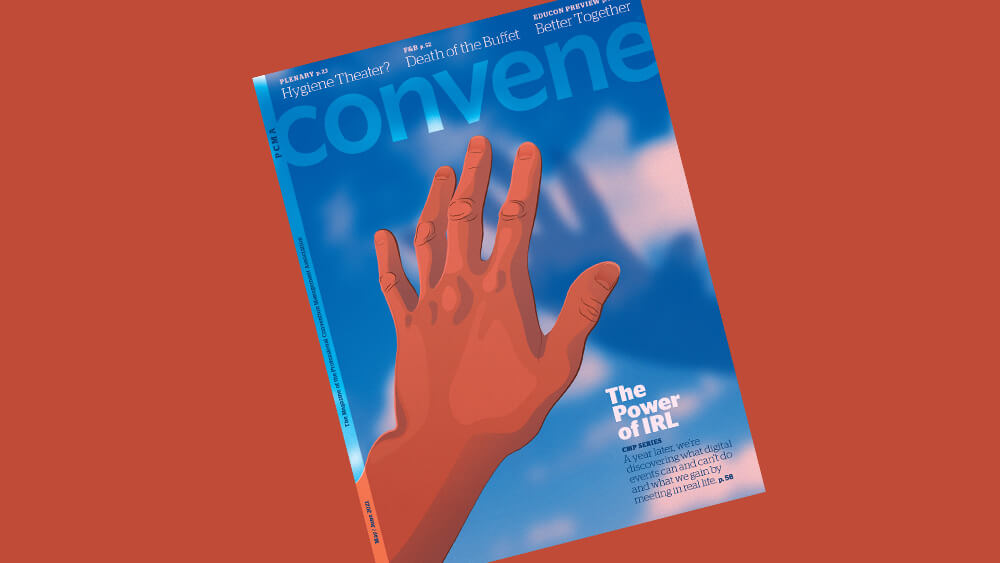The May-June issue of Convene is jam-packed with ideas and insights for meeting professionals. Here’s a rundown of some of the top takeaways from our stories.
- For more May-June stories, visit our May-June edition page.
- For a facsimile edition, click May-June digital edition.
Cover Story and CMP Series: The Power of IRL
As in-person events become possible again, here are ways to lean into the aspects of face-to-face that make them such significant agents of change.
- Cultivate relationships with state and local politicians, policy makers, and other influencers and invite them to your in-person events. This strategy can help companies and organization build on a trend or new idea. “There is a certain sense of gravitas that comes from hosting a conference that looks and feels professional,” said Mark Banahan, campaigns manager for the Vegan Society, which hosted the Grow Green Conference in London several years ago after first holding a series of events at political party conferences. To ensure impact, follow up with social-media posts and press releases.
- Think about internal as well as external audiences. Following the launch of the Airbnb Open conference, the company held 22 more regional events to introduce consumers and policymakers to the then-novel concept of home-sharing. The conference, which grew from 1,500 to 20,000 attendees in just three years, established Airbnb as a movement but also communicated the fast-growing company’s values to its employees, said former Airbnb executive Chip Conley. “There’s no way a virtual gathering could have had that same impact.”
- Design for attendee collaboration. Use events to bring people and new ideas together and then give them the space to collaborate with one another. At Binance, the world’s largest bitcoin exchange, just the act of sitting next to each other and having a drink enabled some attendees to launch major new projects together, said event organizer Moe Levin. Make sure attendees have places — and time in the agenda — to talk together privately and in small groups.
- Connect people by giving them something to do together. The people who get up early for fun runs, or who work with other event participants on CSR projectsare getting more than exercise or the satisfaction of helping somebody else. For everyone, but particularly for men, the ability to engage in shared activities is “really, really key to maintaining our social connections,” said Marissa King, a professor of organizational behavior at the Yale School of Management and author of Social Chemistry: Decoding the Patterns of Human Connection.
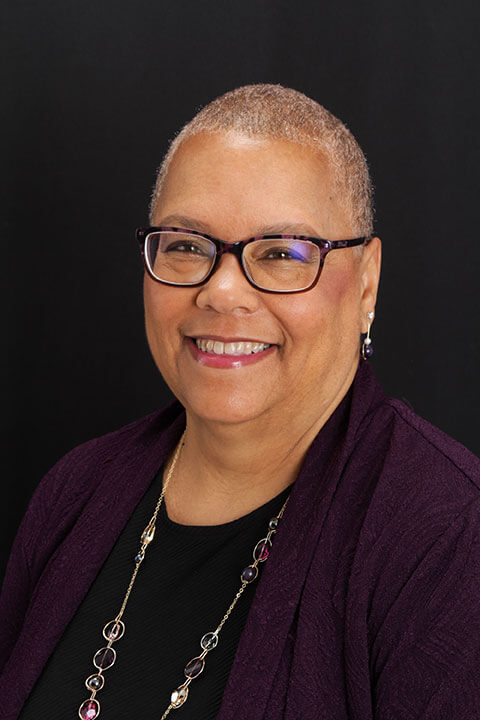
Wanda Johnson
PCMA Groundbreakers: Wanda Johnson
Wanda Johnson, CEO of American Society for Parenteral and Enteral Nutrition (ASPEN) and a PCMA Groundbreaker, stands out not only for her decades-long contributions in the areas of diversity and inclusion, but also for her early adoption of digital education. “It just always seemed to me as a way to get the information in the hands of people who need it,” she said on how digital platforms make education and professional development accessible to more people.
EduCon: We Are Better Together
Main Stage programming at the upcoming PCMA EduCon —to be held July 7–9 at the JW Marriott Phoenix Desert Ridge Resort & Spa in Phoenix, Arizona and online — will predominantly focus on the future of work, with talks from FutureSight Labs CEO Sett Mattison, NeuroLeadership Institute’s Janet Stovall, and other experts on what current shifts in areas like DEI and innovation mean for the world of business events.
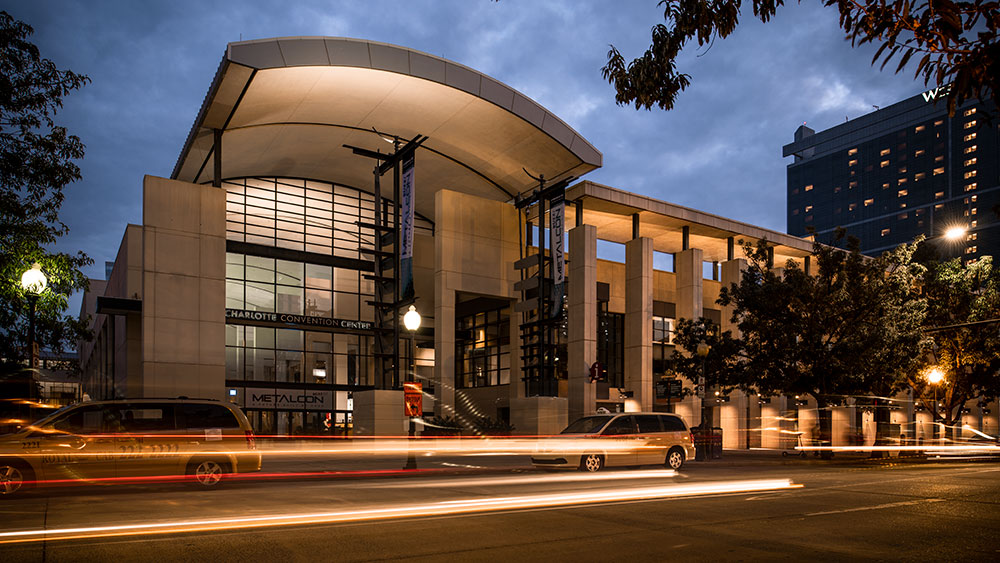
Venues, including the Charlotte Convention Center, are expanding cleaning protocols including air purification as research on the spread of the virus has shifted focus from surface contact to airborne transmission. (Courtesy Charlotte Regional Visitors Authority)
Plenary: Beyond Clean
Reliably healthy and safe environments depend on clean air, especially during the COVID-19 pandemic. Jessica Cooper, chief commercial officer for the International WELL Building Institute, shared some questions event organizers should ask venues to ensure they meet health and safety requirements to help prevent the spread of viruses:
- How the facility manages air filtration and ensures adequate ventilation
- Whether the facility had taken precautions to prevent Legionella disease after a substantial closure or period of decreased operations
- What protocols were being taken to reduce contact with high-touch surfaces
- Whether there were plans to minimize respiratory particle exposure through the air
- How the space is cleaned and sanitized
- What kind of handwashing support is available within the facility
- What kind of emergency-preparedness programs are in place
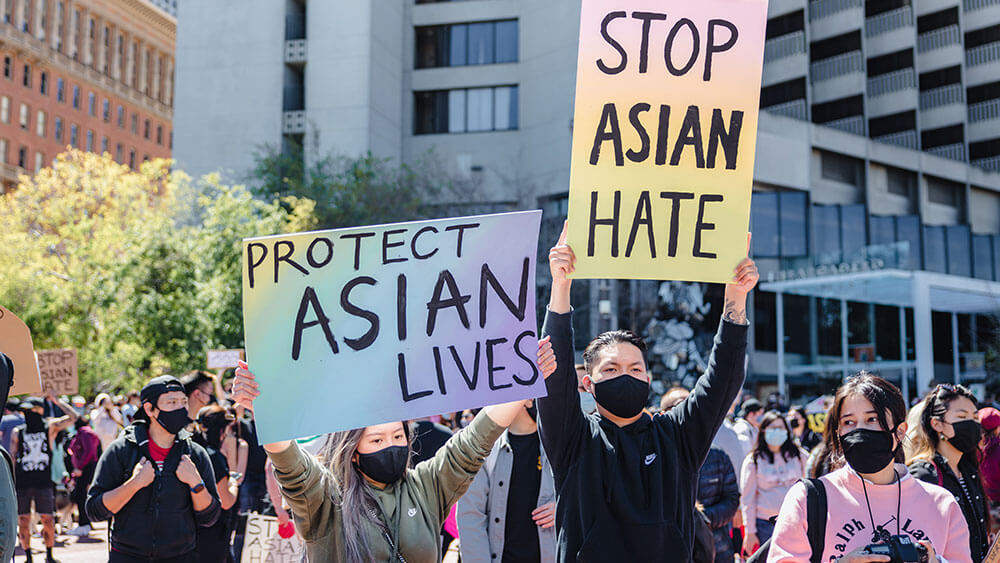
Rallies supporting Asian Americans have been held around the country, joined by other communities taking a stand against discrimination and hate. (Robinson Greig at Unsplash)
Ascent: Combatting Racism Against Asian Americans in the Events Industry
Since the start of the pandemic, the Asian American and Pacific Islander community has been the target of hate crimes and discrimination. Destinations and organizers can help meeting attendees from this community feel welcome and safe at in-person events, say business leaders. Nonprofit Hollaback!, which offers workplace, harassment, and bystander training for organizations, offers the Five Ds to help individuals respond when witnessing harassment:
- Distraction. You may be able to derail and interrupt an incident by engaging directly with the person being harassed.
- Delegate by asking for help from a third party.
- Document the incident, if it’s safe.
- Don’t post it online without their permission.
- Delay your response if you can’t act immediately.
- Directly respond by naming what is happening or confronting the harasser.
The Spark: The Top 5 Skills Every CEO Will Expect
There are five soft skills meetings and events leaders will be seeking in team members as organizations try to successfully navigate post-pandemic events: ambition, vision, and confidence; a strong sales and business development mindset; comfort with change, ambiguity, and uncertainty; the ability to see events as a business versus a logistical and operational endeavor; and leadership across the organization.
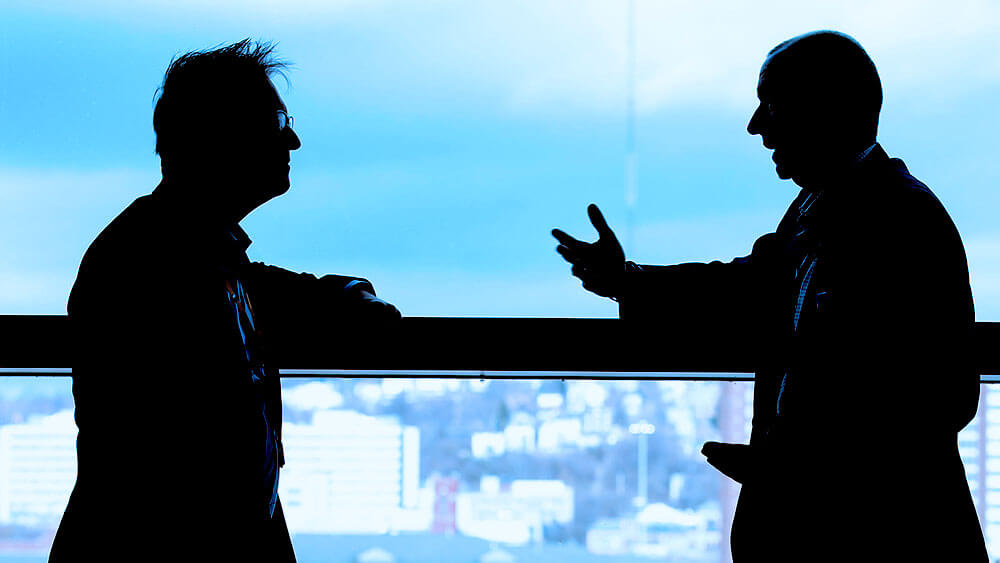
Hallway conversations are going to be even more highly valued in future conferences, Dave Lutz says, so planners should consider chopping 15 minutes off of concurrent sessions to create longer breaks. (Jacob Slaton Photography)
Forward Thinking: Strike While the Iron Is Hot
As conference organizers plan the return of their major conferences, there are five attendee-centric conference design trends emerging that are worth testing out: eliminating opening session pomp and circumstance that could deter next-generation attendees; bookending days with main- stage presentations to bring peers together in one room as much as possible; creating more “white space” in the agenda to allow attendees to talk during the much-missed hallway conversation; building town-square-like spaces that combine learning, member services, refreshments, and entertainment; and making sure the leadership team mingles with attendees rather than participating in invite-only experiences.
Event Marketing: Your Hybrid Future
Consider expanding your definition of hybrid to include webinars, peer-to-peer roundtables, podcasts, videos, and other channels in addition to in-person and online events. When considering your omnichannel approach, figure out what aspects of your event make the most sense digitally and in-person. And you can promote your digital program without siphoning interest in attending in-person by segmenting the two audiences as much as possible and communicating distinct value propositions for each rather than suggesting it’s one event that can be experienced two ways.
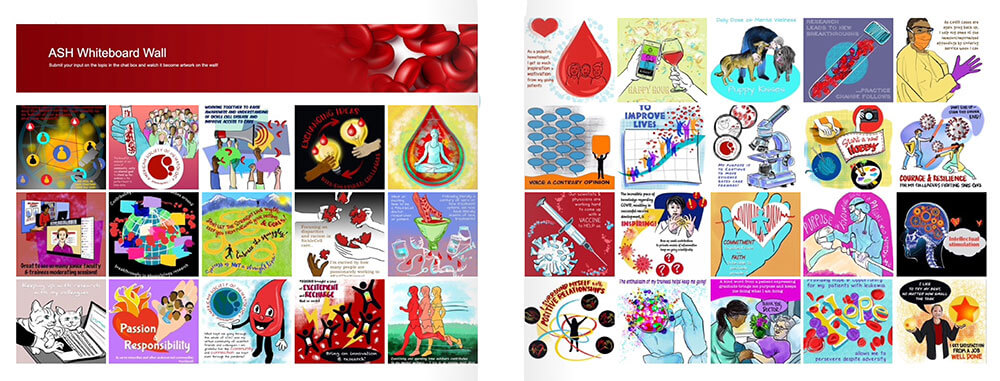
The ASH Whiteboard Wall brought ideas shared by participants to visual life at the virtual annual meeting.
Innovative Meetings: The Lifeblood of Associations
The American Society of Hematology (ASH) reengineered its annual meeting not as a short-term strategy, but to make it a sustainable enterprise. Many organizations offered digital education for free or at a severe discount in 2020, but ASH discovered a more lucrative strategy by staggering ticket pricing based on the length of time attendees would have access to the virtual meetings content: an affordable seven-day pass for those who wanted to participate during their live virtual event; a 30-day subscription to watch sessions on demand after the meeting concluded; and a 90-day subscription to on-demand content for less price-sensitive registrants.
Social Impact: Seeing the Forest
Even in a world of virtual meetings, organizations can find ways to change the physical world in meaningful ways. Partnering with the online company Treedom, organizations can battle climate change while creating economic opportunity through the planting of income-producing fruit trees in Africa, Asia, and South and Latin America.
F&B: A Balanced Diet
The challenge with F&B during COVID-19 times is to allay attendee concerns about transmission via meal functions — which often means single-serve and single-use plastic ware — without taking giant leap backwards in sustainability. Despite the fact that contaminated surfaces have been ruled out recently by the CDC as a primary means by which COVID-19 spreads, food service providers told Convene that single-use items won’t be phased out just yet because clients see them as a measure of protection against the disease. We’ve taken more of a “sidestep” rather than falling backwards in our progress toward more sustainable F&B at events, Centerplate’s director of sustainability said.
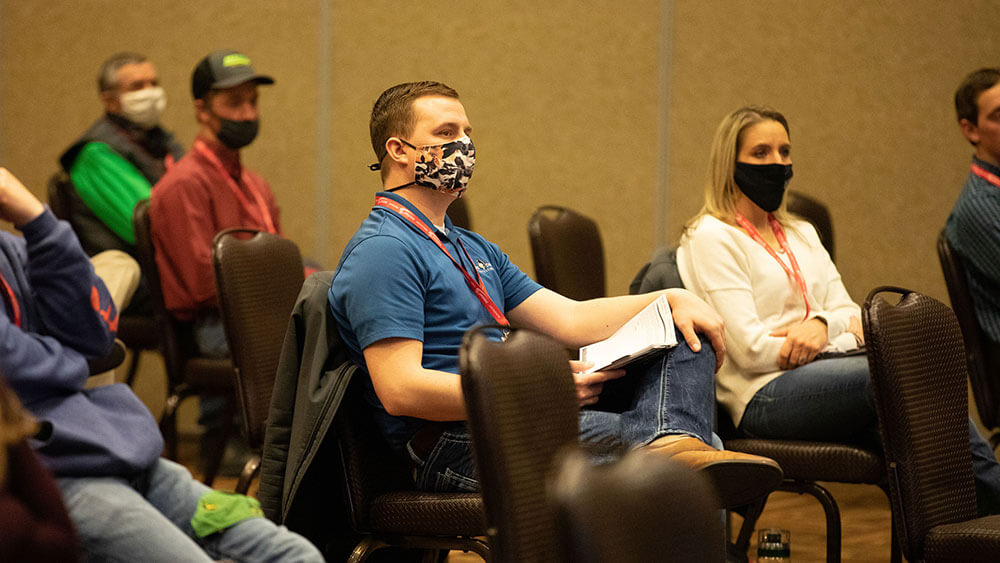
A year after converting their annual business conference to an online event, the Professional Dairy Producers of Wisconsin returned to an in-person event in March, 2021.
Meeting Management: Meeting in a Pandemic, Part 2
When Convene editors caught up with three associations who hosted digital events in 2020 to see what they changed for their 2021 events, not so surprisingly all three stuck with a digital format in one form or another — but all made significant tweaks. The Society for Industrial and Organizational Psychology (SIOP) improved on its original plan to allow for more live interactivity, and the American Society for Nutrition (ASN) switched from complimentary registration to a fee-based model. And even though the Professional Dairy Producers of Wisconsin chose a primarily in-person format for its 2021 Business Conference, a digital component was also on offer.
There’s a Meeting for That: The Big Cheese
For its second all-virtual annual conference, set for July 28-30, the American Cheese Society plans to provide participants opportunities to interact online by recreating popular in-person sessions, like “Meet the Cheesemaker,” in a virtual format. Organizers are working on a way to offer the American Cheese Society Judging & Competition, typically held during the annual in-person conference, to members later in 2021.

